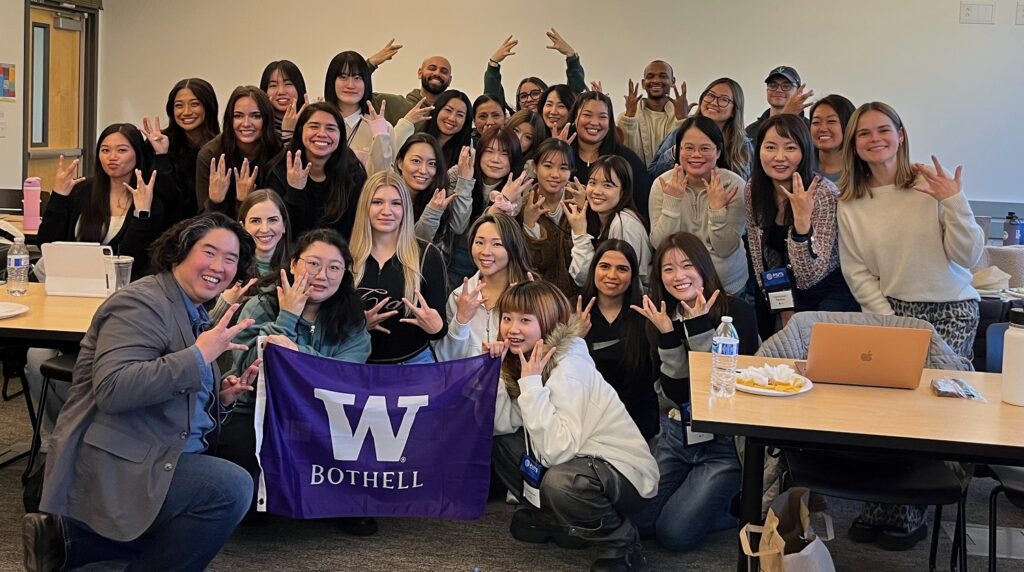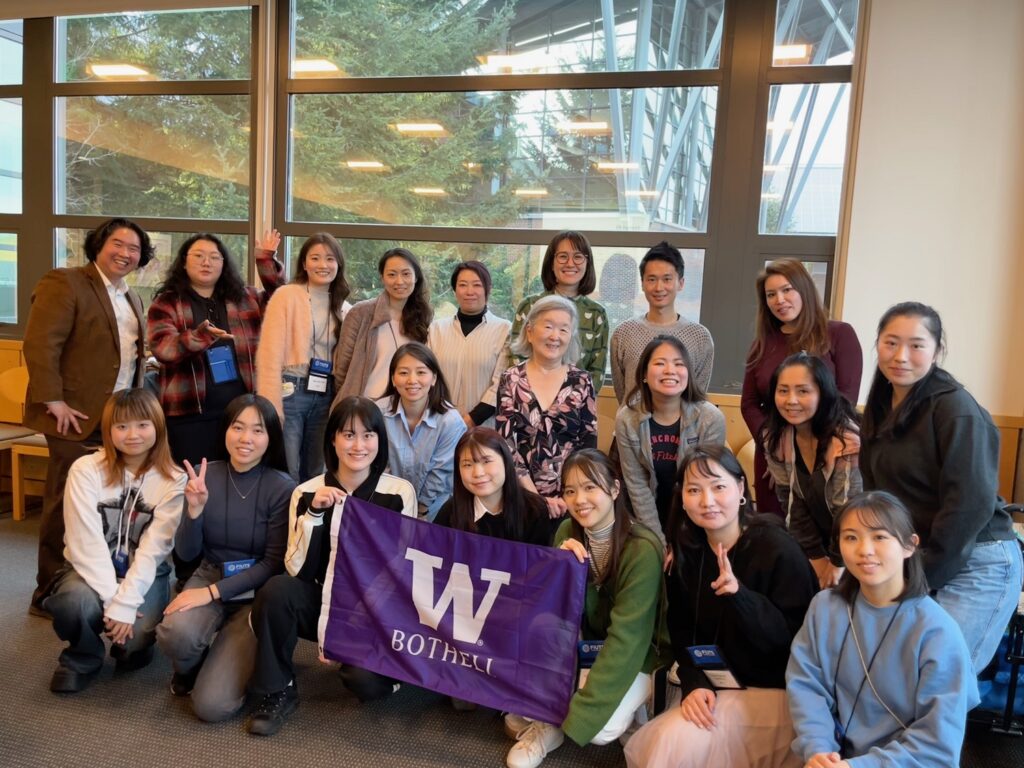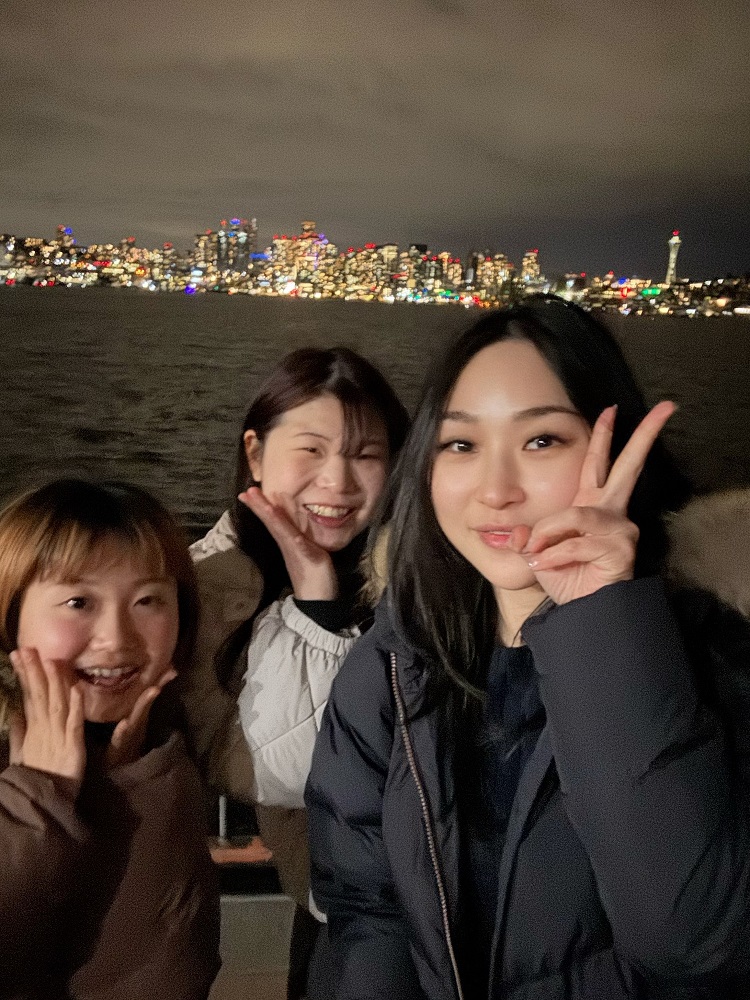Students from the Institute of Science Tokyo visited UW Bothell

Undergraduate and graduate students studying Nursing and Medical Technology at the Institute of Science Tokyo (IST; formerly known as Tokyo Medical and Dental University) visited the University of Washington (UW) as their study abroad program from February 24th to March 7th, 2025. Kosuke Niitsu, PhD, ARNP, PMHNP-BC, Assistant Professor at UW Bothell and Akiko Kondo, PhD, RN, Professor at IST developed the curriculum in collaboration with the Foundation for International Understanding Through Students (FIUTS).
A total of 10 IST students participated in a variety of learning activities through the study abroad program. For example, they joined a class, BNURS460: Translating Scholarly Knowledge to Nursing Practice, that Niitsu taught at UW Bothell (Photo 1). Four undergraduate nursing students from IST delivered oral presentations to introduce the nursing practice and education in Japan:
- Aya Shirakawa: Giving Birth in Japan
- Hanano Okabe: Terminal Care and Angel Care in Japan
- Reina Adachi: Japanese Nursing Education
- Hikari Nakajima: Patients Meals
Each presentation was followed by very lively Q&A sessions where UW Bothell nursing students actively asked questions and discussed to understand the contents further.
On another day, IST students visited another class that Niitsu taught for UW Bothell graduate nursing students: BNURS591: Advanced Fieldwork and Capstone II. Two undergraduate students majoring in Medical Technology delivered oral presentations:
- Mami Ueta: Life in the Department of Medical Technology
- Sakurako Abe: The Need for Collaboration between Nurses and Clinical Laboratory Technicians
Following their presentations, UW Bothell graduate students, who are experienced nurses who are learning to become nurse educators and leaders in the Master of Nursing program, and IST students discussed a wide range of topics, such as the importance of cross-disciplinary collaboration.
Not only the traditional classrooms but IST students also visited a scholarship meeting by the UW Bothell School of Nursing & Health Studies (SNHS). After greeting with SNHS faculty and staff members, a forth-year undergraduate nursing student presented her graduation thesis:
- Serina Koizumi: Initial Response to Incidents in Home Nursing Settings – Analysis of Incident Reports

Furthermore, Haruka Furusho, a graduate student in the Master of Science in Community Health & Social Justice, and Niitsu hosted a special event by inviting nurses and nursing students who are originally from Japan and currently live in the Seattle area and facilitated discussions between panelists and students (Photo 2). As the panelists are familiar with both Japanese and American cultures, they provided crucial perspectives on how nursing practices are different and how they deal with the differences. Those panelists encouraged IST students to explore career options not only in Japan but also in the United States as well. IST students proactively engaged in the discussion with various questions and contributed to meaningful discussion.
In addition to UW Bothell, IST students visited UW Seattle, University of Washington Medical Center, Harborview Medical Center, and other clinics and hospitals, such as the Swedish Cherry Hill Campus and Nikkei Manor.

Jieun An, a former undergraduate nursing student at UW Bothell, took a course, BNURS423 Ethical and Quality Nursing Care, in the Spring 2024 quarter. In this course, Niitsu implemented Collaborative Online International Learning (COIL), which allowed IST and UW Bothell students to learn and interact with each other through online learning (e.g. Zoom). An and Adachi kept in touch through social media after the course was completed, and they had an opportunity to meet in Seattle in person one year after they met online (Photo 3). An stated:
“I truly appreciated the unique opportunity to work with students from IST through the COIL program. I enjoyed exchanging insights on nursing ethics and care practices, which led to many eye-opening moments. It was fascinating to see both the differences and similarities between the nursing fields in America and Japan.
Beyond nursing, we also shared cultural experiences, which made me feel more culturally competent– a crucial skill in healthcare. Although the COIL program was virtual and we faced some language challenges, I still felt a strong connection with the IST students and wanted to stay in touch. I’m glad I did. I had the chance to meet one of the COIL members and another nursing student from IST in person when they came to UW for a study abroad program. We spent time together, continuing our conversations about nursing cultures and healthcare dynamics in America and Japan.
This entire experience was incredibly meaningful. My biggest takeaway is that, despite practicing in different countries with distinct cultures, systems, and languages, we share the same core nursing values: compassion and caring. I believe these values helped us understand each other even more. I am genuinely grateful for the course.”
After the study abroad was over, each student reflected on their experiences.
- Graduate Nursing Students:
- Mahoko Sakurai: “The experience I had in Seattle was very valuable. In particular, learning about the healthcare system and nursing in another country led me to take an objective look at the current situation in Japan. Also, participating in the classes for graduate students was very meaningful since it helped me get an understanding about some of the challenges the hospitals in the US were facing. Lastly, I hope to have another opportunity to come across the people I met in Seattle in my future career. I would like to thank all who had supported this program.”
- Sambuu Ganchuluun: “I am grateful for the opportunity to study nursing education and healthcare systems in both Japan and the United States. Through this experience, I was able to understand the strengths and weaknesses of the healthcare systems in both countries and compare them with the healthcare system in Mongolia. This also gave me the chance to reflect deeply on the strengths and weaknesses of Mongolia’s healthcare system. I am glad that I could summarize my own thoughts on potential areas for improvement. Additionally, I appreciate the opportunity to build connections with nursing students and faculty members at the University of Washington. I believe this experience will contribute to my future career and personal growth. I am filled with gratitude for being able to participate in this program and for all the people I met along the way. Thank you, everyone!”
- Dingyi Long: “My experience in this program has been incredibly valuable for both my academic and personal growth. During the studying, I had the opportunity to learn about the differences between nursing education and practice in the United States and Japan. I was particularly impressed by the emphasis on critical thinking, interdisciplinary collaboration, and cultural competence in American nursing education. These comparisons helped me gain a deeper understanding of how global perspectives can shape nursing education and I am truly grateful for this opportunity.”
- Undergraduate Nursing Students:
- Serina Koizumi: “Participating in this program was an invaluable experience. I gained a deeper understanding of the differences between nursing in the U.S. and Japan and was able to reflect on what will be needed for the future of nursing in Japan. I was also deeply inspired by everyone I met in the UW classes. Many of them were passionate about continuing their studies in nursing, even after securing stable jobs. This made me realize that obtaining a license is not the final goal but rather a starting point. It also prompted me to reconsider my future career path. Additionally, thanks to Reina, I had a wonderful time with Jieun. She shared fascinating insights about life in Seattle, the nursing field there, and much more. I would like to express my deepest gratitude to everyone who was involved in this training program. I hope to see you all again somewhere in the future.”
- Reina Adachi: “After I found out I would be going to the America, I was both excited and nervous. Once I arrived in Seattle, I was happy that everyone in class treated me so kindly. It was fun to talk about cultural differences in Nursing, and I enjoyed introducing Japanese culture. Also, we could have common hobbies: K-pop and anime, which I didn’t expect, so it was an interesting time too. I spent a very stimulating and meaningful time in UW classes. In addition, I was able to meet Jiun for sure because of Professor Niitsu who organized the COIL, but Jiun herself also found time off work to meet me. It was an irreplaceable time, and I want to thank them. I am filled with gratitude to everyone who I met there.”
- Hikari Nakajima: “This program give me some meaning experience. I wanted to study about the difference between Japan and the US, so I could compare them and know a lot of things including good point and bad point. Also, I came to think that I’d like to study in Seattle. I appreciate all the people who were related this program. Thank you so much.”
- Hanano Okabe: “I appreciate all the people I met in Seattle. Studying in the US made me realize the difference in the medical system, social system, and political impact on society between Japan and the US. I loved how confident the nurses and nursing students were in Seattle! Spending time with UW nursing students and Prof. Niitsu, I rediscovered the wonder and pride of nursing studies. Thank you so much everyone!”
- Aya Shirasaka: “Thanks to all of the support from the staff and students in UW, I was able to have a very pleasant time in Seattle. Since I had been thinking and wanting some ideas on planning my future career, it was a pleasure to meet all these wonderful and inspiring people during the trip. I was able to gain a lot of information and also to encounter new values, which changed my ways of thinking-nurses and students I met at Seattle were all very powerful, proud, and magnificent. I would never find out how fun it is to engage in nursing if I stayed in Japan! Thank you so much again for everything, I wish the best for all of the people I met.”
- Undergraduate Medical Technology Students
- Sakurako Abe: “I had a wonderful time in Seattle. The best thing about this program was to be able to meet a lot of wonderful people. Everyone was so kind, and they generously shared their experiences with me and gave advice. They changed the way of thinking about my future career. I decided to never stop learning, even after I start working. Also, I was so glad to see that so many people love Japan. I really appreciate everyone I met in Seattle. Thank you so much, and I am determined to make the most of this experience. I hope I can see them again!”
- Mami Ueta: “First of all, I really appreciate people I met in Seattle. All experiences at there were very precious and must be beneficial for me in the future. I become junior grade in this spring and I just started to think about my career. I want to become a researcher, but it’s hard and difficult pathway. However, I’m excited about my career vision now because many students in UW and people in Seattle have each various perspectives and I’m very encouraged. I learned not only many medical knowledge, but also the passion to pursue what I want to be or do (Many Japanese don’t have it). I’ll never forget the time in Seattle and hope to go back again someday!”
